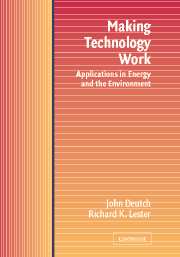Book contents
- Frontmatter
- Contents
- Preface
- 1 Introduction
- 2 Gasohol
- 3 Solar Thermal, Windpower, and Photovoltaic Technologies
- 4 Electricity from Coal
- 5 Controlling Acid Rain from Coal-fired Power Plants
- 6 Greenhouse Gases and Global Warming
- 7 Nuclear Power and Its Fuel Cycle
- 8 Managing Nuclear Waste
- 9 Nuclear Power and Weapons Proliferation
- 10 Natural Gas
- 11 Safety and Risk: Examples from the Liquefied Natural Gas and Nuclear Industries
- 12 Synthetic Fuels
- 13 Fuel Cells For Automobiles
- 14 Energy Models and Statistics
- 15 The Government's Role in Innovation
- 16 Conclusions
- Index
14 - Energy Models and Statistics
Published online by Cambridge University Press: 10 December 2009
- Frontmatter
- Contents
- Preface
- 1 Introduction
- 2 Gasohol
- 3 Solar Thermal, Windpower, and Photovoltaic Technologies
- 4 Electricity from Coal
- 5 Controlling Acid Rain from Coal-fired Power Plants
- 6 Greenhouse Gases and Global Warming
- 7 Nuclear Power and Its Fuel Cycle
- 8 Managing Nuclear Waste
- 9 Nuclear Power and Weapons Proliferation
- 10 Natural Gas
- 11 Safety and Risk: Examples from the Liquefied Natural Gas and Nuclear Industries
- 12 Synthetic Fuels
- 13 Fuel Cells For Automobiles
- 14 Energy Models and Statistics
- 15 The Government's Role in Innovation
- 16 Conclusions
- Index
Summary
Sensible energy planning by governments and corporations requires assumptions about future energy prices and the amounts of energy that will be produced and consumed. This planning also requires accurate and comprehensive data on current and previous energy activities, so that decisions will be as informed as possible. Good historical data and comprehensive energy models that forecast the future are critical for both private industry and government. In this chapter, we first discuss the kinds of statistics that are available, most of them collected by the federal government, and then the efforts to project the characteristics of future energy activity, both in the United States and in the world as a whole.
Of course, the historical data contain a good deal of random error and are not necessarily accurate. Analysts must use statistical tools to determine what can be inferred from the data. We discuss some of these tools in the second part of the chapter. Statistical analysis is an important specialized field and here we do little more than to illustrate the kind of analysis that can be undertaken and the types of questions that it raises.
An energy forecast seeks to generate a projection of future quantities and prices of various types of energy – both on the supply side and the demand side – based on mathematical models of energy markets and historical data.
- Type
- Chapter
- Information
- Making Technology WorkApplications in Energy and the Environment, pp. 221 - 245Publisher: Cambridge University PressPrint publication year: 2003



